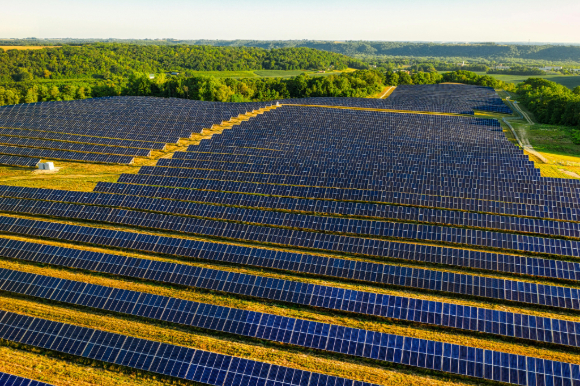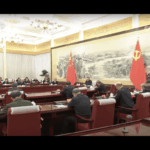The first schools in England to install solar panels under the government’s flagship “Great British Energy” (GBE) programme purchased them from Chinese companies Aiko and Longi, the BBC has discovered.
The initiative, described by the government as “the first major project for Great British Energy – a company owned by the British people, for the British people,” aims to promote clean energy by installing rooftop solar panels on public buildings. However, the revelation that the panels were sourced from Chinese firms has sparked concerns about ethical supply chains and the potential use of forced labour.
Labour MP Sarah Champion voiced her concerns over the procurement process, insisting that UK taxpayers’ money should not support companies potentially linked to human rights abuses. “I’m really excited about the principle of GB Energy,” Champion said. “But it’s taxpayers’ money and we should not be supporting slave labour with that money. And wherever possible, we should be supporting good working practices and buy British if we can.”
She acknowledged that purchasing solar panels domestically or from countries with higher labour standards may come at a higher cost in the short term, but argued it was a necessary trade-off. “There are solar panels made around the world in Taiwan, Canada, even in the UK,” she added.
Both Aiko and Longi told the BBC they prohibit forced labour in their manufacturing and supply chains. China remains the dominant player in the solar industry, producing over 80% of all solar panels globally, according to the International Energy Agency. However, some suppliers in the Xinjiang region—where there are long-standing allegations of human rights abuses against Uyghur Muslims—have been linked to the solar panel supply chain.
The UK government amended legislation earlier this year to prevent GB Energy from investing in renewable projects if there is credible evidence of modern slavery involved in the production of materials or components.
GB Energy responded to the criticism by confirming that all solar panel contracts for the school installations complied with UK procurement rules, including strict requirements under the Modern Slavery Act. “GBE will seek to uphold these requirements in its contracting arrangements and are actively engaging with international partners to raise the bar globally on solar supply chain accountability,” a spokesperson said.
Mark Candlish, director of GB-Sol, which claims to be the only UK-based manufacturer of conventional solar panels, highlighted the difficulty of sourcing solar components without ties to forced labour. “Polysilicon is a key social issue facing our industry, with the risk of forced labour in the main mining areas,” he said. “The global solar market is so dominated by China that it is difficult to avoid buying Chinese if you want the low-cost energy and low-carbon benefits of solar PV.”
Nearly half of the world’s polysilicon—a crucial material in solar panels—is estimated to come from China’s Xinjiang region. While figures vary, energy analysts at Wood Mackenzie reported that 27% of Chinese polysilicon was produced in Xinjiang in 2023, following increased scrutiny of labour practices in the region.
Despite growing awareness of potential abuses, many governments and businesses, including in the UK, continue to import Chinese solar panels due to their affordability. According to HMRC trade data, 68% of the UK’s solar panel imports in 2024 came from China—up from 61% the previous year.
A 2023 report by Sheffield Hallam University, titled Over-Exposed, linked multiple solar companies to suppliers in Xinjiang. One of its authors, Alan Crawford, said that transparency in solar supply chains has since worsened. “Companies that were willing to comment are now silent,” he noted.
Sarah Champion, who also chairs the International Development Select Committee, emphasized the need to hold firms accountable and to exclude companies implicated in human rights abuses from receiving public contracts. “Abuse in renewable supply chains is insidious and hard to root out,” she said.
A GBE spokesperson reiterated the company’s commitment to ethical sourcing: “There is no place for forced labour or unethical practices in the UK’s energy transition. That is why we are introducing a statutory duty on Great British Energy to prevent modern slavery in its supply chains and reviewing supplier transparency and disclosure standards to ensure confidence in all public-facing renewable programmes.”
Longi and Aiko, both members of the Solar Stewardship Initiative—a program aimed at improving supply chain accountability in the solar industry—rejected any suggestion that their operations were linked to forced labour.
An Aiko spokesperson said the company is “committed to upholding the highest standards of ethical business conduct and responsible sourcing,” and takes any concerns about labour practices seriously. “As part of our ongoing efforts, we engage with suppliers to promote transparency and continuous improvement in line with international guidelines,” the spokesperson added.
Longi stated it “categorically affirms that forced labour has no place within our supply chain” and expressed regret over the Sheffield Hallam report’s findings. “The conclusions in the Over-Exposed report may not fully reflect the comprehensive measures Longi has implemented to ensure full compliance with international labour standards,” a company spokesperson said, adding that third-party audits are used to verify compliance and mitigate potential risks.
China has been widely accused of committing crimes against humanity against Uyghur Muslims and other ethnic minorities in Xinjiang, including the use of forced labour in various industries such as polysilicon production. The Chinese government has consistently denied all allegations of abuse.
GB Energy, established by the Labour government as a publicly owned energy company, is investing approximately £200 million in solar installations on 200 schools and NHS facilities. The first portion of this funding was spent on installing panels from Aiko and Longi at 11 schools in England.
As the programme moves forward, government and public scrutiny over the origin and ethical sourcing of components in the green energy transition is expected to intensify.






